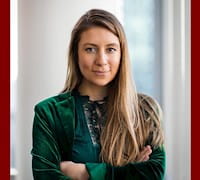Tell us about yourself and your early career
I was born in Serbia and lived there until I was 15, at which point my entire family emigrated to the States. The concept of building was always fascinating to me, and I knew I wanted to have a career in either design or engineering. I ended up getting a degree in chemical engineering at the University of Illinois Urbana-Champaign, and then joined an oil and gas technology licensor, in their career development program. Most of my early career was spent working with international clients globally and advising them on optimizing operations. I also spent time as a product manager for the company's first IOT product, which is how I fell in love with technology. I then took a role with GE Transportation, where I built AI and machine learning optimization models for their supply chain.
What about technology do you love?
My life has always been structured in terms of thinking about future possibilities rather than where we are today. Throughout my life, I saw technology as an enabler to make these possibilities a reality, better and faster. After years of building and commercializing tech products, I realized I wanted to do something on my own. A big driver for getting my MBA has been to gain the know-how of building my own company.
Did you always harbor entrepreneurial aspirations?
Yes, pretty consistently throughout my life. When I was a child, I remember designing my own clothing. I would create the designs, find the material, and my grandma would sew them for me. I always knew I wanted to continue designing and building, hence my degree in engineering. At one point, I was exploring making art videos, and I ended up forming a group with two girls to create art for local businesses. I’ve had a continuous stream of ideas that I’ve wanted to commercialize, but I was missing the knowledge of how to scale before coming to Chicago Booth.
Catch us up to your whirlwind entrepreneurial journey
I started Chicago Booth in 2019, and met my business partner Dip Majumder at a networking event. We formed a company with an intention to take it through the Polsky Center for Entrepreneurship and Innovation’s New Venture Challenge (NVC), which is the top-ranked accelerator program in the country run by Chicago Booth. We didn't get into the NVC on our first try, but we tried again and got in for spring of 2020. I also transitioned into the startup full-time, just as we were entering the NVC, and spent three months there in an incredibly accelerated environment where we were able to pivot quite a bit and get a lot of feedback on our business model. From there, we went into the Polsky accelerator, which gives students a chance to work intensively on their businesses over the summer, and then we participated in the fundraising accelerator All Raise in the fall. So it's been quite a bit of an activity-packed year for us.

